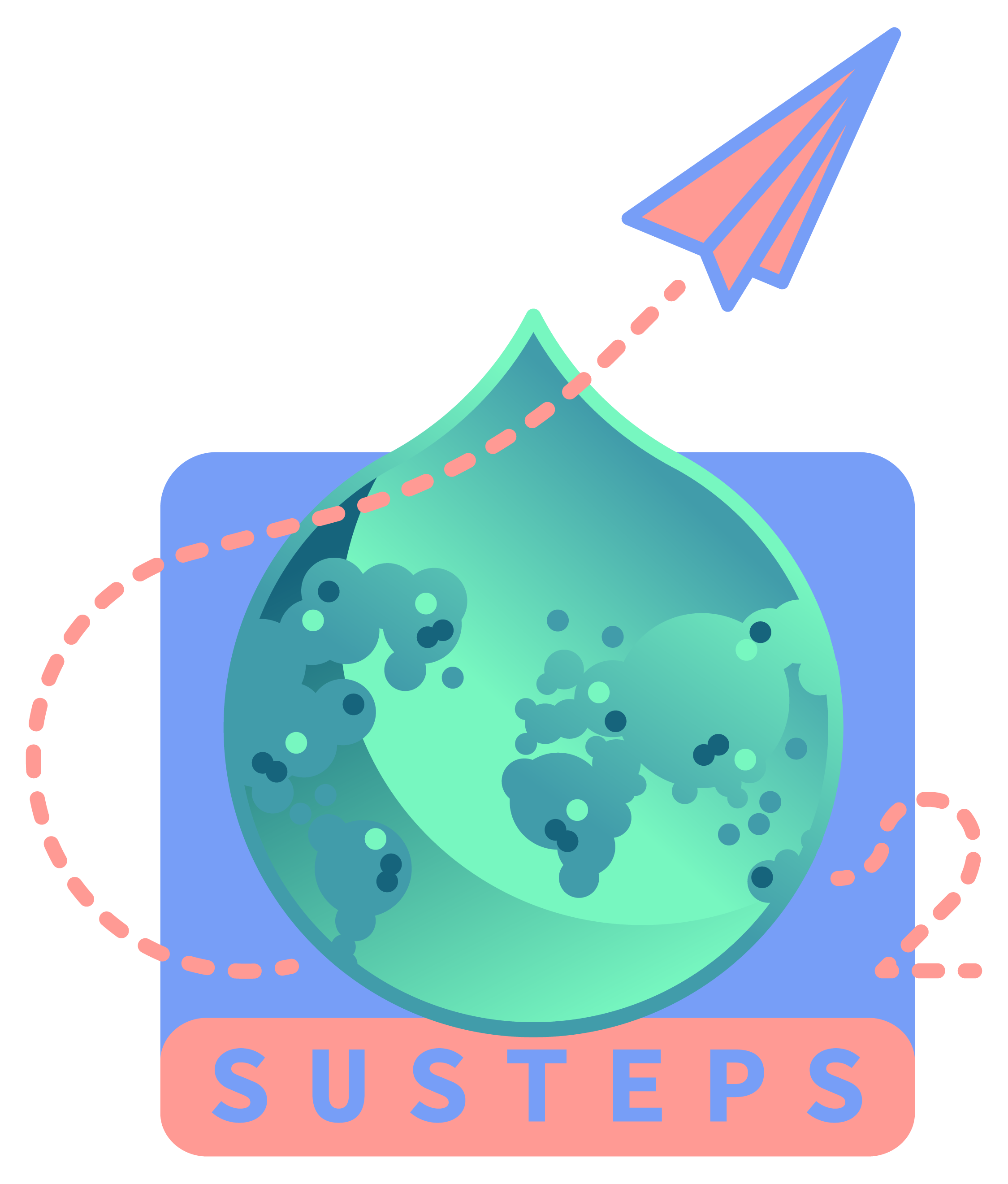Project Overview
Cultivation and conversion of microalgae for sustainable biofuel production
The SUSTEPS project is a comprehensive initiative focused on advancing the sustainable production of biofuels from microalgae. It addresses the entire value chain of this innovative process, aiming to identify and overcome challenges while maximizing opportunities. The project involves various key elements, including microalgae cultivation and carbon dioxide (CO2) fixation, processing microalgae into biocrude, upgrading biocrude, producing green hydrogen, and valorizing aqueous streams.
SUSTEPS integrates CO2 capture from high-emission sources and nutrient-rich wastewater for microalgae growth, reducing biomass production costs and mitigating harmful CO2 emissions. Through various technical work packages, SUSTEPS ensures that its processes adhere to environmental sustainability principles, addressing climate change, water resource protection, biodiversity conservation, pollution prevention, and the transition to a circular economy.
The project’s approach emphasizes holistic sustainability assessment, covering the entire life cycle of the biofuels production process, and incorporates socio-economic studies to quantify its impact on society. In summary, the SUSTEPS project seeks to revolutionize the microalgae-based biofuel industry by creating a sustainable, cost-efficient, and environmentally responsible production process that addresses key challenges throughout the entire value chain.
Read more
Consortium Partners and core business are one of the strongest points of SUSTEPS. Technological and scientific partners (PSI, SDU, BOUN, and ALBERMALE) are experts on main areas of microalgae development, aqueous valorisation, hydrothermal liquefaction process, and catalyst upgrading. On the other hand, TUBITAK and FZJ will use their infrastructure to develop biocrude upgrading and green hydrogen, among other tasks. In the meantime, CALGARY, IRESEN, and UNIFEI oversee the regionalization of the study in North America, Africa, and South America, respectively while overseeing the green hydrogen production and separation processes. Furthermore, ERINN, will contribute to build an international cooperation network between similar projects. Finally, ARDITEC is on charge of techno-economic, social, and assessment, as well as the communication and exploitation strategies.
Objectives
SUSTEPS aims to enhance the sustainable production of algae-based biofuels by addressing challenges and leveraging opportunities in the value chain. The project focuses on developing a cost-effective…
Impact
The production of biofuels using microalgae as a raw material and CO2 as a feedstock holds significant potential for positive environmental impact. This innovative approach not only provides…
Workplan
SUSTEPS main overall objective is to improve key knowledge, identify systemic constraints and opportunities, and propose solutions for the scaling up of a sustainable algae-based biofuel value chain. In order to…
Approach and Methodology
Innovative customized biofuels targeting market standards will be produced using leading- edge catalysts while minimizing waste streams and impurities.
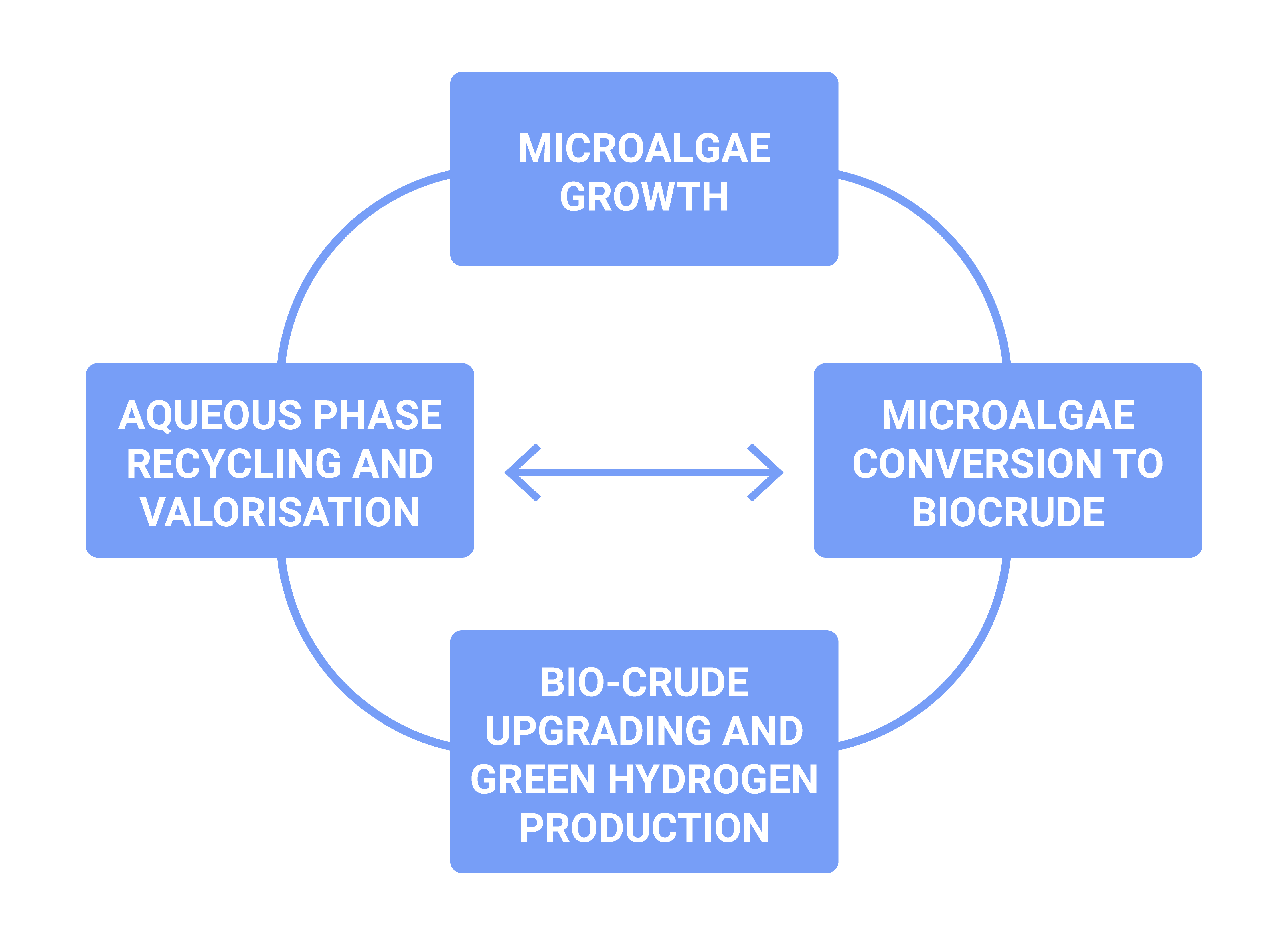
Fig.1 Development of new sustainable biofuel using microalgae as raw material
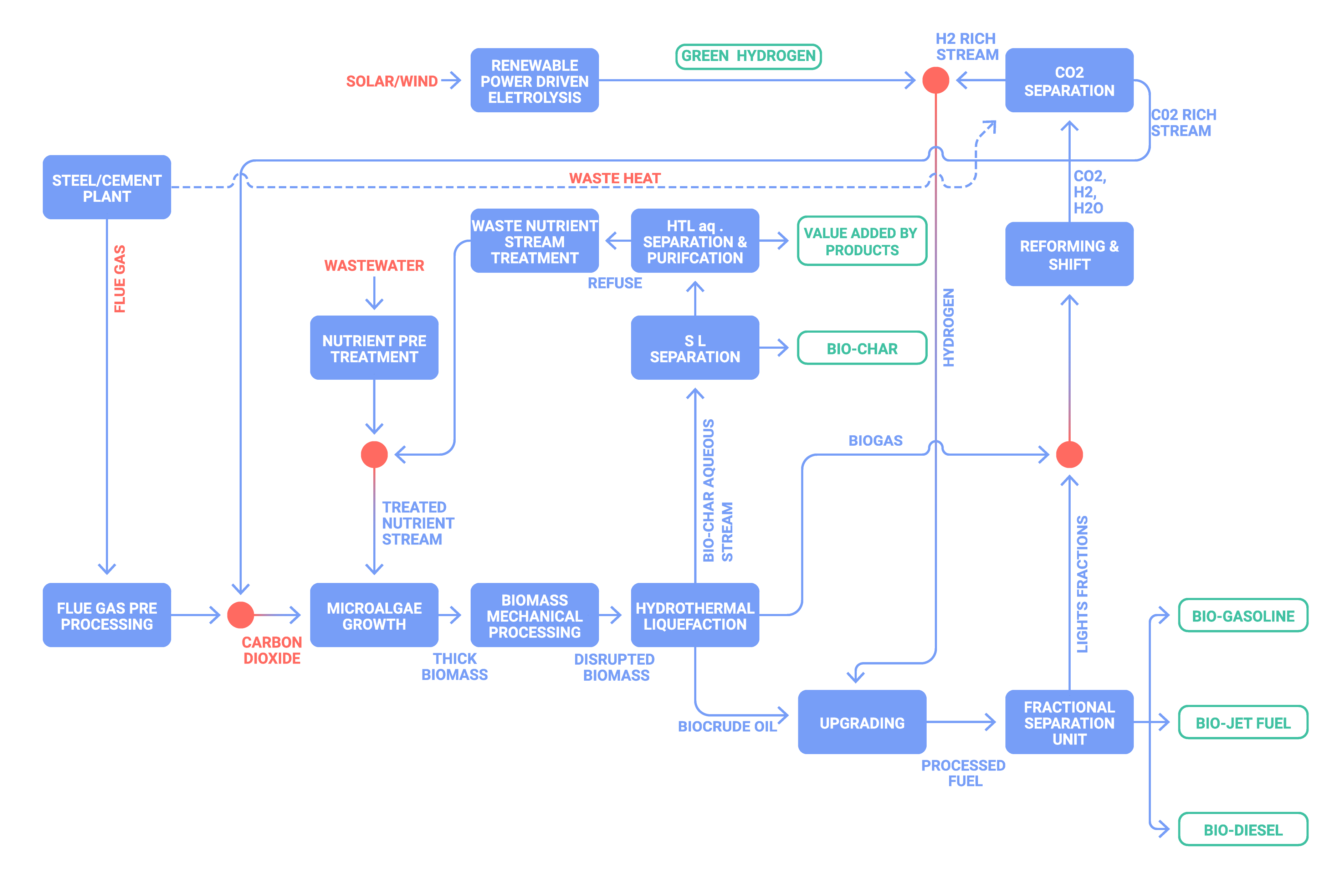
Objectives
SUSTEPS aims to enhance the sustainable production of algae-based biofuels by addressing challenges and leveraging opportunities in the value chain. The project focuses on developing a cost-effective and eco-friendly bio-refinery concept. This concept efficiently produces biofuel from non-food microalgae by utilizing CO2 emissions from high-pollution sources and nutrients from wastewater. The goal is to minimize production costs, promote large-scale production, and contribute to a more sustainable biofuel industry.
Read more
In order to ensure the successful achievement of the project, the following specific objectives are set:
– Objective 1
To foster international cooperation that will contribute to building global knowledge for the scaling-up and the sustainability assessment of sustainable algae-based biofuels value chains
This collaborative effort aims to build a comprehensive global knowledge base for scaling up and assessing the sustainability of biofuel value chains. SUSTEPS involves experts worldwide which will span the entire biofuel value chain and provide valuable input for developing best practices and concepts.

– Objective 2
To design an integrated process and guide the work on the separate processes ensuring that, when brought together, the maximum benefit is derived in terms of cost effectiveness/economic viability, environmental sustainability and human safety.
SUSTEPS is developing an innovative process design for algae-based biofuel by incorporating new data developed within the project. The sustainability analysis prioritizes safety, followed by environmental, social, and economic aspects. This approach aims to enhance cost-effective and sustainable large-scale biofuel production.
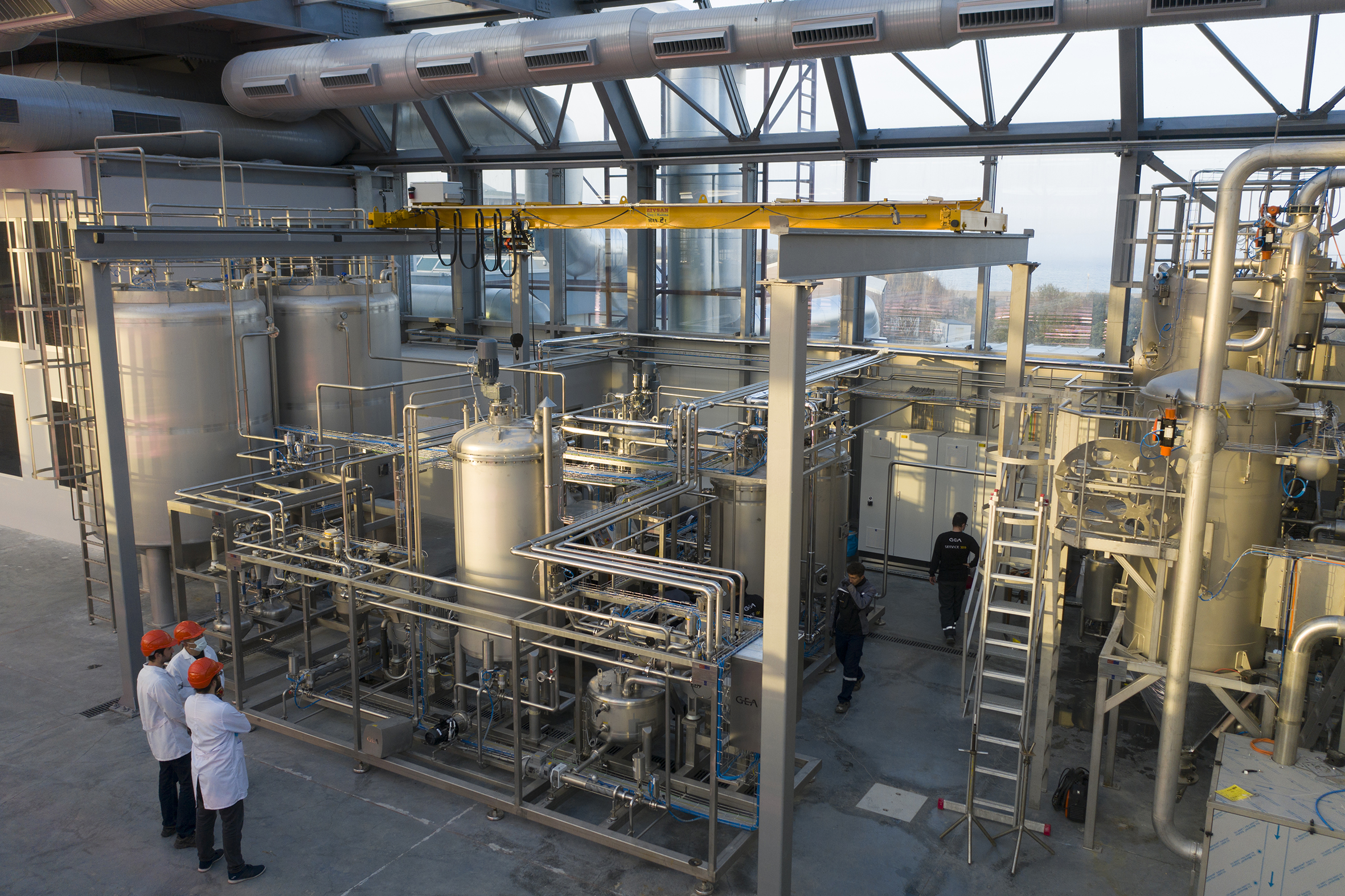
– Objective 3
To develop advanced microalgal bioproduction systems supported by system biology tools which aim to achieve substantial increase in productivity by efficient carbon capture and utilization while addressing large-scale bottlenecks in microalgal biofuels
SUSTEPS integrates a circular economy approach, yielding a resource-efficient, cost-effective, and carbon-neutral biomass for high-value biofuel formulations. This addresses challenges in scaling up sustainable biofuel value chains and evaluating optimal CO2 input and algae medium parameters for efficient production.
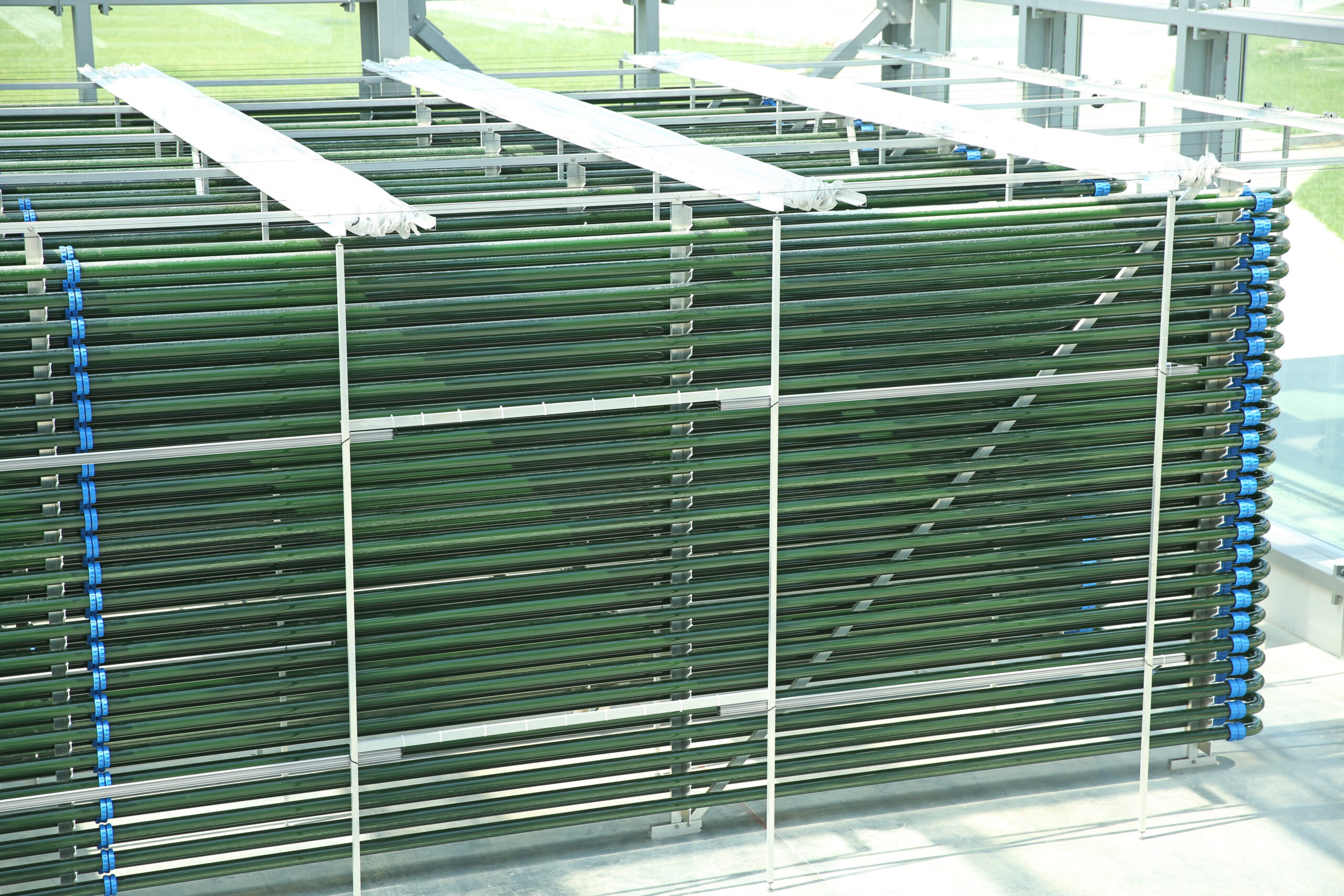
– Objective 4
To develop a high-oil-yield biocrude generation process based on optimisation of microalgae conversion
SUSTEPS will use an improved catalytic Hydrothermal Liquefaction (HTL) route to optimize microalgae conversion to demetallized biocrude. The process includes concentration optimization of identified compounds in effluents. The Responsible Partner (PSI) utilizes a unique HTL and salt separation system, maximizing biocrude yield. At least three valuable compounds will be identified from effluents for extraction and additional utilization.
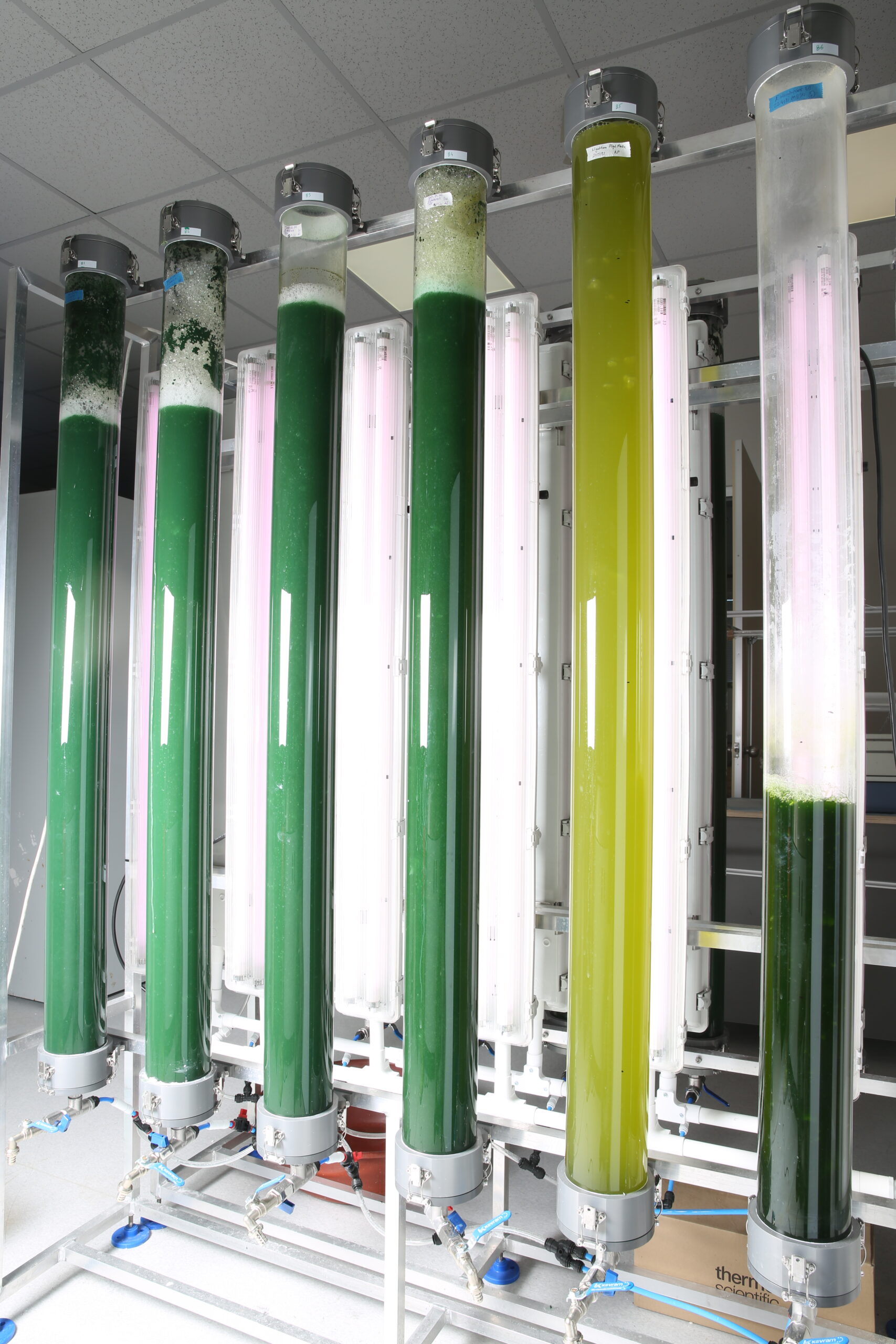
– Objective 5
To develop a cost-effective algae-based biofuel upgrading process that meets the physical and chemical specifications as demanded by the fuel market
The goal is to produce high-quality biofuel fractions that match standard fuels utilizing in-house bio-hydrogen and green hydrogen. Refining HTL effluents and processing gas streams enhance the valorization of gaseous hydrocarbons, crucial for hydrogen provision in the upgrading process. The proposed configuration is adaptable to ensure impurity removal and final fuel yield, addressing challenges as needed.
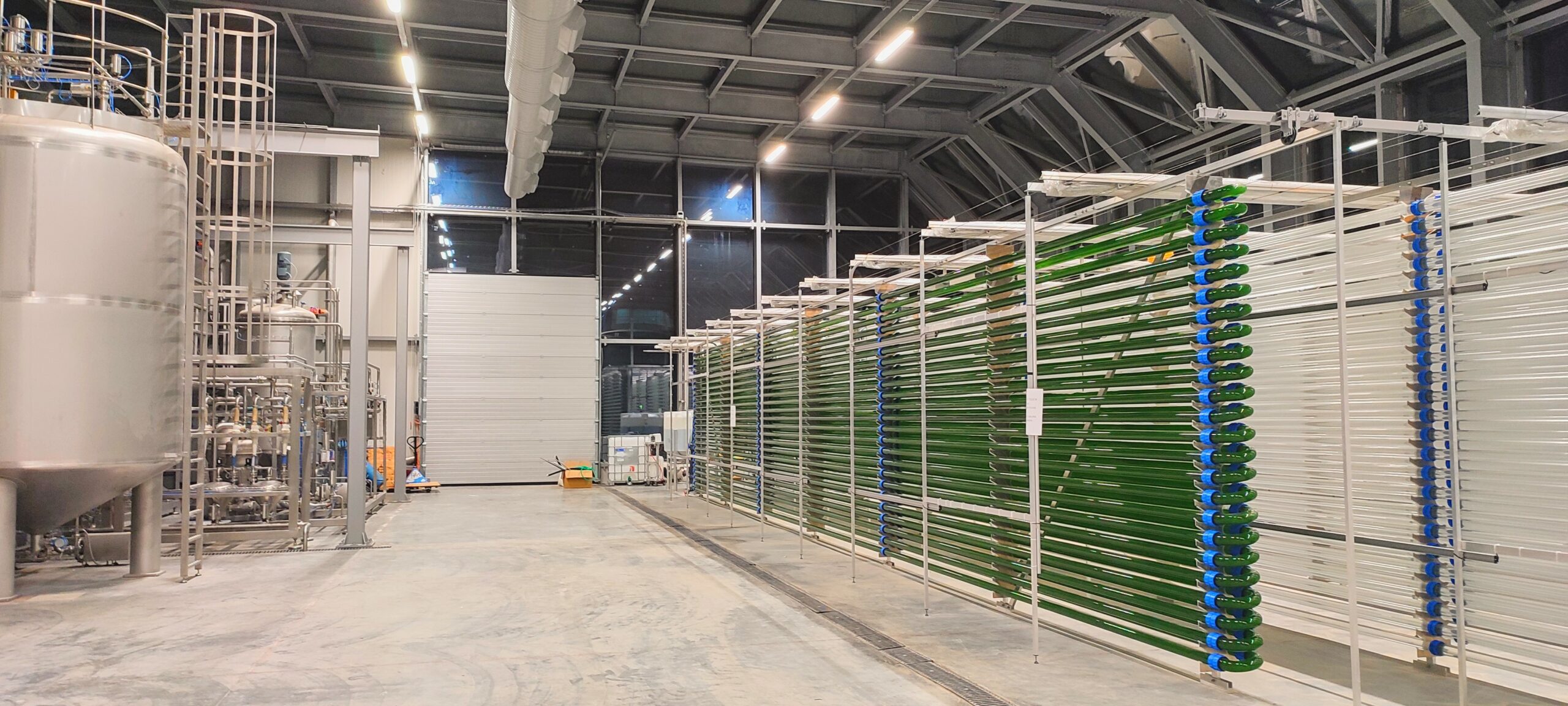
– Objective 6
To establish valorisation processes to increase process economy and decrease adverse environmental effects of microalgae-based biofuel production
The project’s process concept not only reduces greenhouse gas emissions in products but also enhances environmental friendliness in water use, circularity, pollution, and ecosystems. The HTL aqueous stream will be managed by extracting value-added chemicals as by-products, with the remaining stream treated and recycled for microalgae cultivation.
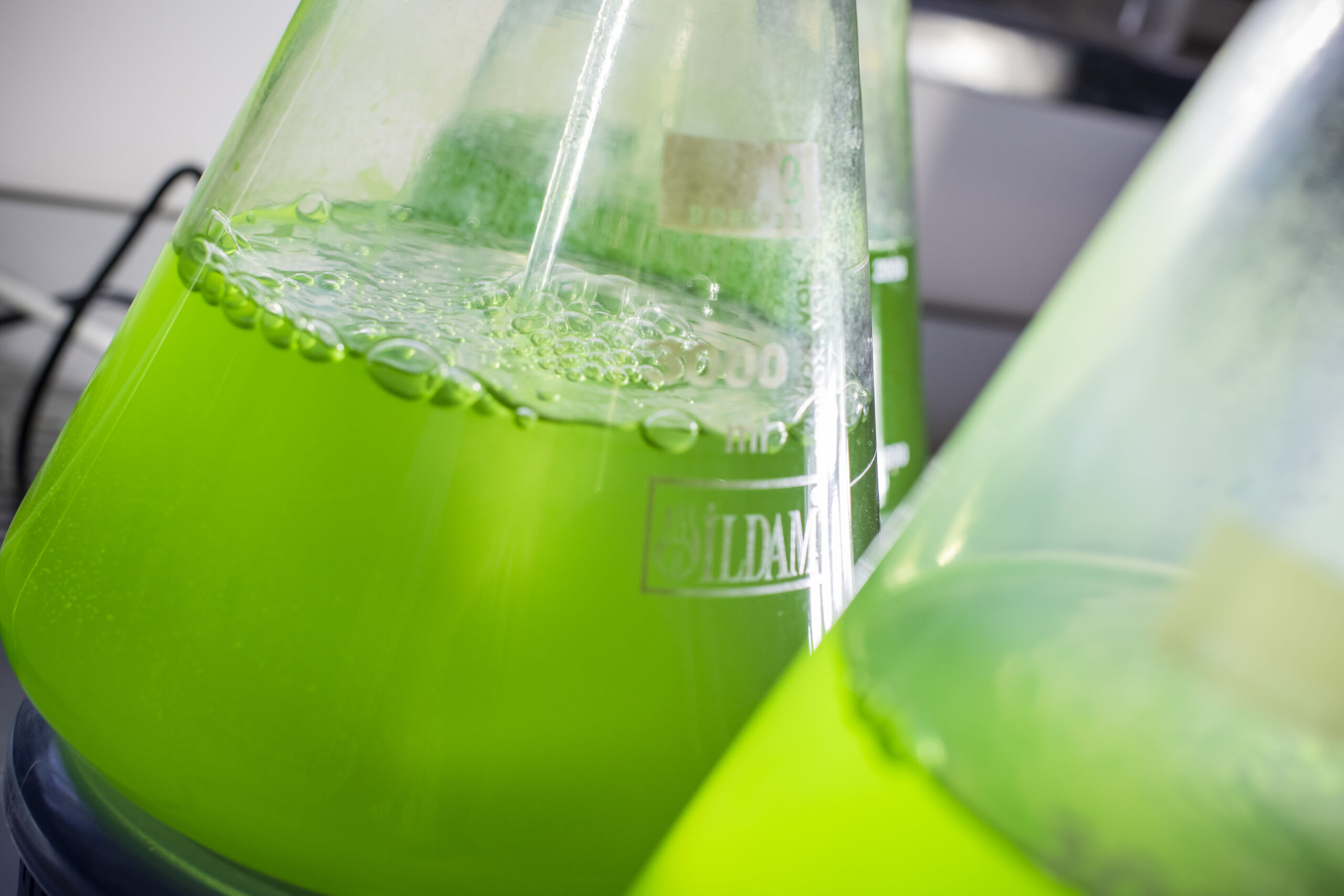
– Objective 7
To develop a carbon efficient- and cost-effectiveness-increased sustainable biofuel production process at TRL 4 level
Meeting TRL4-5 requirements increases production scalability, reduces operational costs and optimally valorizes all streams. The objective involves a step-by-step process, considering the full cycle and implementing a comprehensive network to decrease operational costs and enhance the effective valorization of all streams.
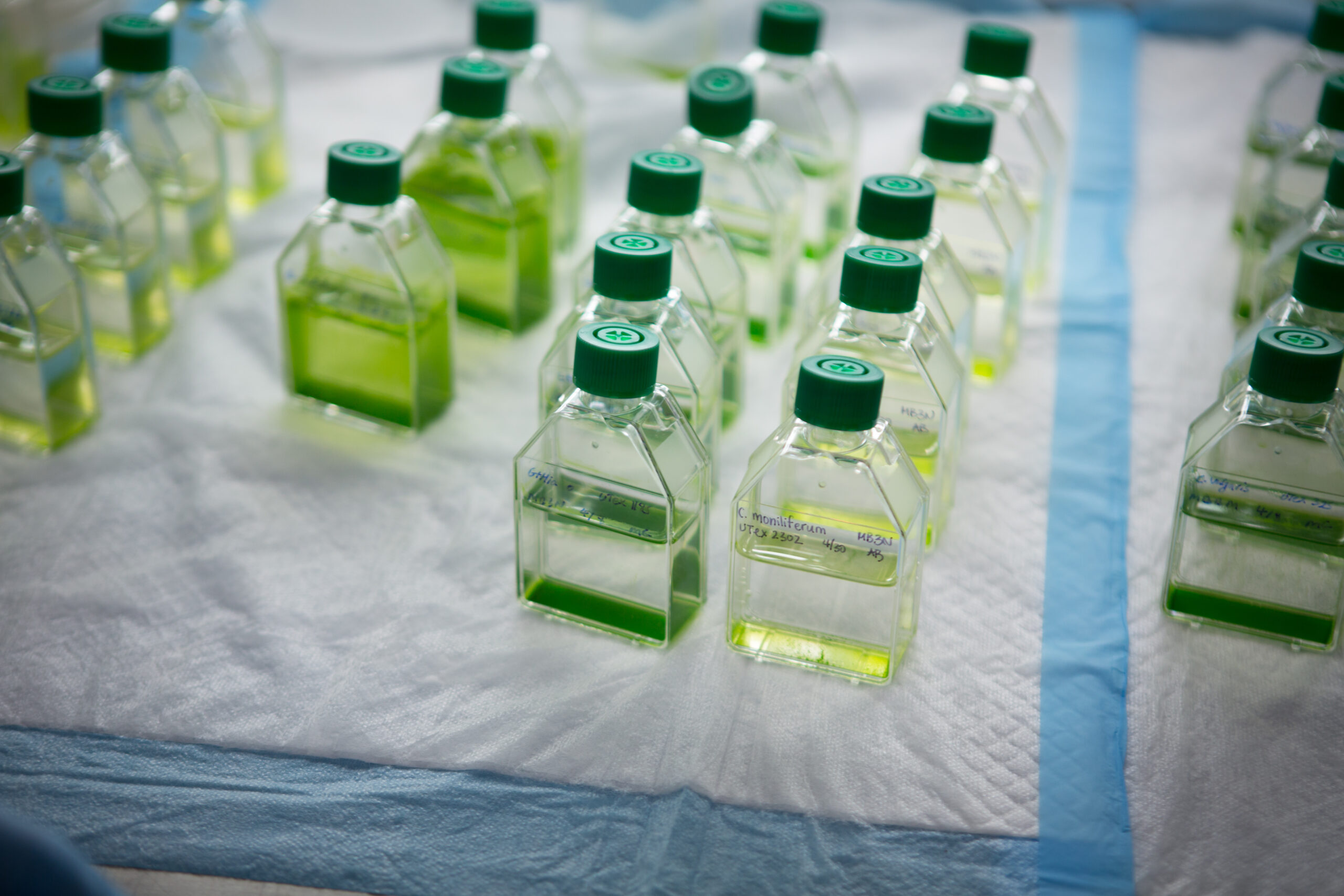
– Objective 8
To engage with key target groups and effectively communicate, disseminate and exploit SUSTEPS outputs and key exploitable results
SUSTEPS prioritizes engaging stakeholders and end users through efficient communication and outreach for sustained visibility at various levels. The project aligns with global knowledge-sharing goals in sustainable biofuels, reflecting its international collaboration.

Impact
The production of biofuels using microalgae as a raw material and CO2 as a feedstock holds significant potential for positive environmental impact. This innovative approach not only provides a sustainable source of biofuels but also contributes to carbon capture by utilizing the flue gas of the production process, consequently mitigating greenhouse gas levels in the atmosphere. Microalgae’s rapid growth and high lipid content make them an efficient biofuel feedstock, offering a renewable alternative to traditional fossil fuels. By harnessing these technologies, the biofuel production process has the potential to reduce overall carbon footprints, enhance energy security, and pave the way for a more sustainable and environmentally friendly energy future.
Scientific
SUSTEPS aims to revolutionize renewable fuel technologies by advancing the algae-based biofuels value chain. The project’s goal is to create technologies that meet the market’s specifications for replacing fossil fuels in targeted sectors. This will pave the way for a cleaner and more sustainable energy future.
SUSTEPS targets enhancing efficiency not only in the main conversion process but across the entire value chain. By incorporating waste stream valorization and utilizing green hydrogen and biologically captured process flue gas, the integrated bio-thermo-chemical process is designed to be more efficient.
Environmental
SUSTEPS strengthens the scientific foundation for renewable energy technologies in Europe through international collaboration. This collaboration also aligns with the European Green Deal priorities, emphasizing sustainability and environmental responsibility.
By 2050, the aim is to achieve commercial exploitation of these technologies with a commitment to net-zero greenhouse gas emissions. This aligns with global efforts to combat climate change by promoting the widespread adoption of sustainable energy solutions.
Social
SUSTEPS prioritizes sustainability by assessing the environmental, economic, and social impacts throughout the entire algae-to-biofuel production value chain. This holistic approach ensures that any solutions developed strike an appropriate balance, considering the societal implications. By addressing these social factors, SUSTEPS aims to contribute to a sustainable and socially responsible biofuel industry.
Economic
Increased economic viability is a key driver for the market uptake of biofuels produced by SUSTEPS. The project’s use of algae as a feedstock, coupled with its carbon-neutral nature, makes biofuels more appealing to policymakers, regulators, industry stakeholders, and the general public.
Moreover, SUSTEPS plays a crucial role in reducing costs in the Carbon Capture, Use, and Storage (CCUS) value chain. The development of a waste-heat integrated CO2 capture process addresses a significant process in the wider application of CCUS. By making environmental actions economically feasible SUSTEPS contributes to a more sustainable world.
Read more
Impact
The expected impact of the overall project is to contribute to “More efficient, clean, sustainable, secure and competitive energy supply through new solutions for smart grids and energy systems based on more performant renewable energy solutions”. However, SUSTEPS will have the main contribution in the development of renewable energy technologies and services where 7 impacts are expected:
Availability of disruptive renewable energy and renewable fuel technologies and systems in 2050 in order to accelerate the replacement of fossil-based energy technologies.
Reduced cost and improved efficiency of renewable energy and fuel technologies and their value chains. De-risking of renewable energy and fuel technologies with a view to their commercialexploitation and net zero greenhouse gas emissions by 2050.
Better integration of renewable energy and renewable fuel-based solutions in energy consuming sectors.
Reinforced European scientific basis and European export potential for renewable energy technologies through international collaboration.
Enhanced sustainability of renewable energy and renewable fuels value chains, taking fully into account social, economic and environmental aspects in line with the European Green Deal priorities.
More effective market uptake of renewable energy and fuel technologies.
The acceleration of the development of Carbon Capture, Use and Storage (CCUS) as a CO2 emissions mitigation option in industry applications.
Work plan
SUSTEPS main overall objective is to improve key knowledge, identify systemic constraints and opportunities, and propose solutions for the scaling up of a sustainable algae-based biofuel value chain. In order to ensure the successful achievement of the project, bringing the required expertise and existing knowledge in new developments and results, SUSTEPS project benefits from the multidisciplinary collaboration between several experts who coordinate their work around 8 Work Packages.
SUSTEPS is divided in eight WPs as shown in the following figure:
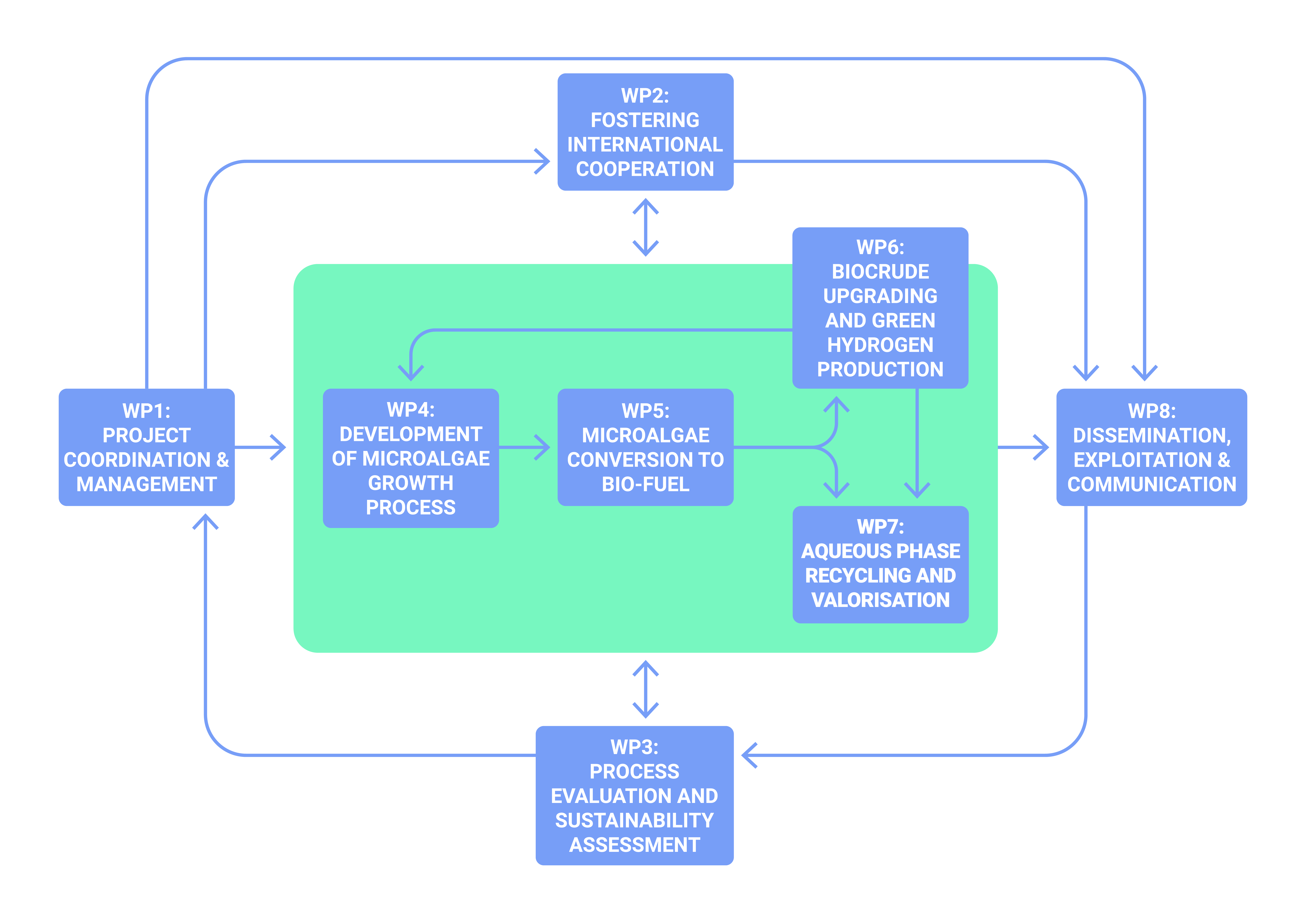
Enhance this chart
– WP1: Project coordination and management
To ensure effective coordination and management of all project activities, including monitoring technical progress and financial spend, completion of milestones, deliverables and work as agreed before the beginning of the project.
– WP2: Fostering international cooperation
To foster international cooperation that will contribute to building global knowledge for thescaling-up and the sustainability assessment of sustainable algae-based biofuels value chains, by getting input from experts from around the world and establishing active links with related projects and initiatives that will lead to new networks in sustainable algae-based biofuels value chains worldwide.
– WP3: Process evaluation and sustainable assessment
To coordinate and evaluate SUSTEPS through a process simulation, and examine the economic, social and environmental impacts to provide evidence about feasibility and environmental / human safety, which will support standardised and internationally recognized life cycle assessment and suitability criteria for eventual end-products.
– WP4: Development of microalgae growth process
To demonstrate microalgae with efficient CO2 uptake by improved CCM, and other CO2 fixing pathways and explore the use of CO2-binding mechanisms as targets for engineering to increase performance, leading to increased carbon uptake and metabolism with significant chemical production in modified microalgae.
– WP5: Microalgae conversion to crude bio-fuel
To develop a high-yield biocrude production process based on various microalgae, through the optimisation of an HTL system, including identification of optimum HTL parameters and optimisation of SCW demetallisation of the biocrude using a catalyst, leading to a better understanding and identification of the compounds present in the effluents.
– WP6: Biocrude upgrading and green hydrogen production
To develop a cost-effective biocrude upgrading process, which is assisted by in-house produced bio-hydrogen and green hydrogen to produce biofuel fractions (SAF, BG, RD) with enhanced quality.
– WP7: Aqueous phase recycling and valorisation
To establish aqueous stream valorisation process in order to increase process economy and decrease adverse environmental effects, in this respect; to develop membrane/chromatography-based separation methods to extract value- added chemicals and optimise water recovery and recycling.
– WP8: Dissemination, exploitation and communication
WP8 is dedicated to dissemination, exploitation and communication, promoting SUSTEPS and its results to multiple audiences and ensuring impact through effective exploitation focusing on identified target users. Contribute, upon invitation by the CINEA, to common information and dissemination activities to increase the visibility and synergies between Horizon Europe supported actions.
